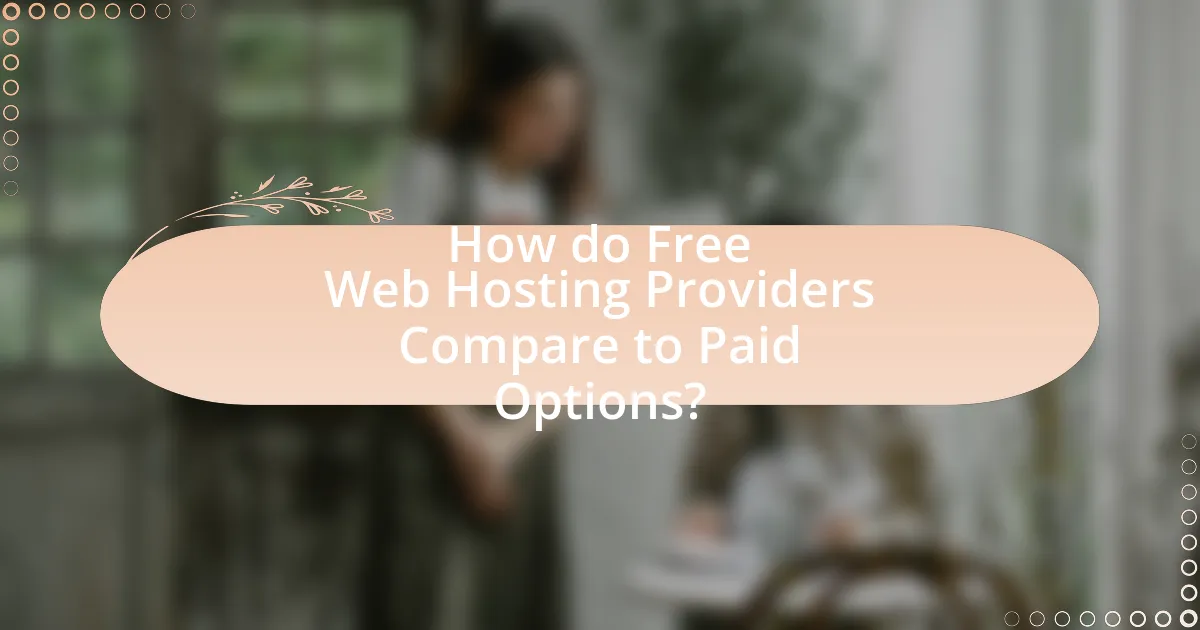The article focuses on the essential features to consider when selecting free web hosting providers. It outlines key characteristics such as limited storage space, bandwidth restrictions, and the presence of advertisements, which are common across free hosting platforms. The importance of choosing a reliable provider is emphasized, as it affects website performance, security, and user experience. Additionally, the article discusses the risks associated with free hosting, including limited customer support and potential security vulnerabilities, while comparing free services to paid options. It also highlights best practices for optimizing websites on free hosting platforms and the significance of uptime guarantees for online success.

What are the Essential Features of Free Web Hosting Providers?
The essential features of free web hosting providers include limited storage space, bandwidth restrictions, and the presence of advertisements. Free web hosting typically offers around 1GB to 5GB of storage and bandwidth limits that can range from 1GB to 10GB per month, which is suitable for small personal websites or testing purposes. Additionally, many free hosting services display ads on users’ websites, which can detract from the user experience. Security features, such as SSL certificates, are often minimal or absent, and customer support is usually limited compared to paid hosting options. These characteristics are common across various free hosting platforms, making them suitable for users with basic needs but inadequate for more demanding projects.
Why is it important to choose the right free web hosting provider?
Choosing the right free web hosting provider is crucial because it directly impacts website performance, reliability, and security. A suitable provider ensures that your website loads quickly, remains accessible, and is protected from potential threats. For instance, according to a study by Google, a one-second delay in page load time can lead to a 20% decrease in conversions, highlighting the importance of speed. Additionally, free hosting services often come with limitations such as bandwidth restrictions and lack of customer support, which can hinder website growth and user experience. Therefore, selecting a reliable free web hosting provider is essential for maintaining a professional online presence and achieving your website’s goals.
What risks are associated with using free web hosting services?
Using free web hosting services poses several risks, including limited resources, lack of customer support, and potential security vulnerabilities. Limited resources can lead to slow website performance and downtime, as free services often impose restrictions on bandwidth and storage. The absence of reliable customer support means that users may struggle to resolve technical issues promptly, impacting their website’s functionality. Additionally, free hosting providers may not implement robust security measures, making websites more susceptible to hacking and data breaches. These factors collectively compromise the reliability and safety of websites hosted on free platforms.
How can the right provider enhance your website’s performance?
The right provider can enhance your website’s performance by offering optimized server resources, which directly impacts loading speed and uptime. For instance, providers that utilize Content Delivery Networks (CDNs) can distribute content across multiple locations, reducing latency and improving access speed for users globally. Additionally, reliable providers often implement caching mechanisms and provide scalable bandwidth, ensuring that websites can handle traffic spikes without degradation in performance. Research indicates that a one-second delay in page load time can lead to a 7% reduction in conversions, highlighting the importance of selecting a provider that prioritizes performance optimization.
What key features should you look for in free web hosting providers?
When evaluating free web hosting providers, key features to consider include storage space, bandwidth, uptime reliability, customer support, and the presence of ads. Storage space should be sufficient to accommodate your website’s content, while bandwidth must support your expected traffic without throttling. Uptime reliability is crucial, with a minimum of 99.9% uptime being standard to ensure your site remains accessible. Customer support options, such as live chat or email, are important for resolving issues quickly. Additionally, many free hosting services display ads on your site, which can detract from user experience; thus, finding a provider that minimizes or eliminates ads is beneficial.
What is the significance of storage space in free web hosting?
Storage space in free web hosting is significant because it directly impacts the amount of content a user can upload and manage on their website. Limited storage can restrict the number of files, images, and databases, which may hinder the website’s functionality and growth. For instance, many free hosting services offer storage ranging from 500 MB to 2 GB, which may be insufficient for websites with rich media or extensive content. This limitation can lead to performance issues, such as slow loading times, and may ultimately affect user experience and search engine rankings. Therefore, adequate storage space is crucial for ensuring that a website can operate effectively and accommodate future expansion.
How does bandwidth affect your website’s accessibility?
Bandwidth directly affects a website’s accessibility by determining the amount of data that can be transmitted to users at any given time. Limited bandwidth can lead to slower loading times, which may prevent users from accessing the website efficiently. For instance, a website with high traffic and insufficient bandwidth may experience delays or timeouts, making it difficult for users to load pages or access content. According to a study by Google, a one-second delay in loading time can result in a 20% decrease in user satisfaction and a 7% reduction in conversions. Therefore, adequate bandwidth is crucial for ensuring that a website remains accessible and provides a positive user experience.
Why is customer support crucial for free web hosting users?
Customer support is crucial for free web hosting users because it directly impacts their ability to resolve issues and maintain their websites effectively. Free web hosting often comes with limited resources and features, making users more reliant on support to troubleshoot problems, such as downtime or technical glitches. According to a survey by Zendesk, 67% of customers have switched to a competitor due to poor customer service, highlighting the importance of responsive support in retaining users. Without adequate customer support, free web hosting users may experience prolonged outages or unresolved technical difficulties, which can hinder their online presence and user experience.

How do Free Web Hosting Providers Compare to Paid Options?
Free web hosting providers typically offer limited features compared to paid options, which provide enhanced performance, security, and support. Free hosting often includes restrictions such as bandwidth limits, storage constraints, and the presence of ads, while paid hosting generally allows for greater customization, higher uptime guarantees, and dedicated customer service. For instance, a study by HostingAdvice found that 70% of users experienced slower load times with free hosting compared to paid services, which can significantly impact user experience and SEO rankings. Additionally, paid options often include SSL certificates and backups, which are crucial for website security and data integrity, features that are frequently absent in free hosting plans.
What are the limitations of free web hosting compared to paid services?
Free web hosting has several limitations compared to paid services, primarily in terms of reliability, features, and support. Free hosting often includes limited bandwidth and storage, which can hinder website performance and scalability. Additionally, free services frequently display ads on users’ sites, detracting from the user experience and brand image. Security features are typically minimal or non-existent in free hosting, exposing websites to higher risks of hacking and data loss. Furthermore, customer support is often lacking, with limited or no access to technical assistance, which can lead to prolonged downtime and unresolved issues. These limitations make free web hosting less suitable for businesses or serious projects that require stability and professionalism.
How do advertising policies differ between free and paid hosting?
Advertising policies differ significantly between free and paid hosting services. Free hosting typically imposes restrictions on the types and amounts of advertisements users can display, often requiring users to display the host’s ads, while paid hosting allows users greater freedom to manage their own advertising strategies without mandatory ads from the host. For instance, many free hosting providers, such as WordPress.com, include their own advertisements on user sites as a means of monetization, whereas paid services like Bluehost or SiteGround offer ad-free experiences and the ability to implement custom ads, enhancing user control and potential revenue generation.
What are the security implications of using free web hosting?
Using free web hosting can lead to significant security implications, including increased vulnerability to data breaches and lack of support for security updates. Free hosting services often do not provide robust security measures, such as SSL certificates or firewalls, making websites more susceptible to attacks. Additionally, these services may monetize user data or display intrusive ads, which can compromise user privacy and trust. According to a 2021 study by the Cybersecurity & Infrastructure Security Agency, 60% of free hosting providers lack essential security features, highlighting the risks associated with their use.
What are the common features that free web hosting providers offer?
Free web hosting providers commonly offer features such as limited storage space, bandwidth, and subdomain usage. These providers typically allocate a small amount of disk space, often ranging from 500 MB to 2 GB, which is sufficient for basic websites. Bandwidth limits are also imposed, usually between 1 GB to 5 GB per month, restricting the amount of data transferred. Additionally, free hosting often includes a subdomain (e.g., yoursite.provider.com) instead of a custom domain, which can affect branding. Many free hosting services also display advertisements on hosted sites, which is a trade-off for the lack of fees. These features are standard across various free hosting platforms, making them easily identifiable for users seeking no-cost options.
What types of control panels are typically available?
The types of control panels typically available for web hosting include cPanel, Plesk, and DirectAdmin. cPanel is widely recognized for its user-friendly interface and extensive features, making it a popular choice among users. Plesk offers a similar range of functionalities but is known for its compatibility with both Linux and Windows servers. DirectAdmin is a lightweight alternative that provides essential features at a lower cost. These control panels facilitate website management, domain management, and server configuration, enhancing the user experience in web hosting environments.
How do free web hosting providers handle domain names?
Free web hosting providers typically offer subdomains instead of custom domain names. Users can create websites using a format like “yourname.provider.com,” which allows them to host content without purchasing a separate domain. This approach is cost-effective for users but limits branding and professionalism, as the website’s URL reflects the hosting provider rather than the user’s identity. Many free hosting services also provide options to upgrade to a paid plan, which includes the ability to connect a custom domain, enhancing the website’s credibility and visibility.

What Should You Consider Before Choosing a Free Web Hosting Provider?
Before choosing a free web hosting provider, you should consider the reliability and uptime guarantees offered by the provider. Reliable hosting services typically ensure at least 99.9% uptime, which is crucial for maintaining website accessibility. Additionally, you should evaluate the storage and bandwidth limits, as many free providers impose strict limitations that can hinder website performance. Security features, such as SSL certificates and regular backups, are also essential to protect your data and maintain user trust. Lastly, consider the level of customer support available, as responsive support can be vital in resolving issues quickly.
How can you evaluate the reliability of a free web hosting provider?
To evaluate the reliability of a free web hosting provider, assess uptime guarantees, customer reviews, and support options. Uptime guarantees indicate the percentage of time the service is operational; reputable providers typically offer at least 99.9% uptime. Customer reviews on platforms like Trustpilot or Reddit provide insights into user experiences, highlighting issues such as downtime or poor support. Additionally, reliable providers offer accessible customer support through multiple channels, ensuring assistance is available when needed. These factors collectively help determine the overall reliability of the hosting service.
What user reviews and ratings should you look for?
When evaluating free web hosting providers, look for user reviews that highlight uptime reliability, customer support responsiveness, and ease of use. Reviews indicating consistent uptime above 99% demonstrate reliability, while positive feedback on customer support responsiveness, such as quick resolution times, indicates effective assistance. Additionally, user ratings that emphasize a user-friendly interface suggest that the hosting service is accessible for beginners. These factors are critical as they directly impact the overall user experience and functionality of the hosting service.
How can uptime guarantees impact your website’s success?
Uptime guarantees significantly impact a website’s success by ensuring consistent availability, which directly influences user experience and search engine rankings. Websites with high uptime, typically above 99.9%, experience fewer disruptions, leading to increased visitor retention and higher conversion rates. For instance, a study by Google found that a 0.1-second delay in page load time can reduce conversions by 7%. Additionally, search engines like Google prioritize websites with reliable uptime in their ranking algorithms, meaning that consistent availability can enhance visibility and traffic. Therefore, uptime guarantees are crucial for maintaining a successful online presence.
What are the best practices for using free web hosting services?
The best practices for using free web hosting services include selecting a provider with reliable uptime, ensuring adequate bandwidth and storage, and understanding the limitations of the service. Reliable uptime is crucial as it affects website accessibility; providers like InfinityFree and 000webhost often boast 99.9% uptime. Adequate bandwidth and storage are essential to accommodate website traffic and content; many free hosts offer limited resources, which can hinder performance. Additionally, users should be aware of potential ads on their sites and the lack of customer support, which are common drawbacks of free hosting. Understanding these factors helps users make informed decisions and optimize their web presence effectively.
How can you optimize your website on a free hosting platform?
To optimize your website on a free hosting platform, focus on minimizing load times and improving user experience. This can be achieved by compressing images, utilizing browser caching, and minimizing the use of heavy scripts. For instance, using tools like TinyPNG can reduce image sizes without sacrificing quality, which is crucial since studies show that a 1-second delay in page load time can lead to a 7% reduction in conversions. Additionally, implementing a Content Delivery Network (CDN) can enhance loading speeds by distributing content across multiple servers. These strategies are essential for maintaining performance on free hosting platforms, which often have limited resources.
What troubleshooting tips can help you manage common issues?
To manage common issues with free web hosting providers, regularly check server uptime and performance metrics. Monitoring tools can help identify downtime or slow response times, allowing for timely action. Additionally, clearing browser cache and cookies can resolve loading issues, as outdated data may hinder website performance. Ensuring that all software, including content management systems and plugins, is updated can prevent compatibility issues that often arise with free hosting services. Lastly, consulting the provider’s support documentation or community forums can provide specific solutions to recurring problems, as many users share similar experiences and resolutions.